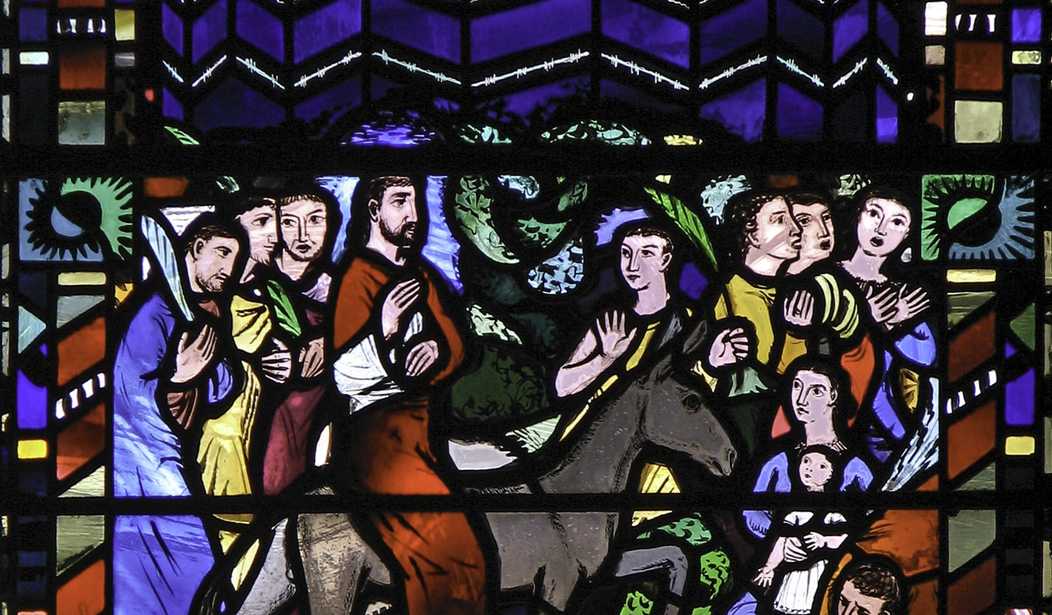Jesus Christ is not just a religious figure. According to Christian doctrine, he is a king, and he will inherit everything on heaven and on earth. His triumphal entry into Jerusalem on Palm Sunday confirms this, and even the way the Roman soldiers mocked him as “king of the Jews” is a subtle tribute to his ultimate royalty.
But his royalty is of a different kind. He was not born to be served, but to serve. He is the king whose own people rejected him, and the end of his triumphal entry isn’t a coronation — it’s an execution. Jesus enters the holy city with pomp and circumstance, but he is led out limping, barely able to carry the very cross upon which he will die.
Every little boy and girl who attends church on this holy day knows the story, but there are surprises here, even for the most committed reader of scripture. Here are three remarkable things about Jesus’ entry into Jerusalem.
1. Jesus’ Entry is Humble, Not Like a Roman Triumph
Films new and old have depicted the victorious return of a Roman general, a parade of pomp reserved for only the most accomplished victors, also known as a “triumph.” On these occasions, the general, in a purple toga and with a laurel wreath on his head, led a large procession: spoils of war, his large contingent of unarmed soldiers, and slaves — especially the disgraced leaders of the defeated enemy. He rode a four-horse chariot and proceeded to offer sacrifices at the temple of Jupiter.
This ceremony was so impactful on the people and elites of Rome that medieval kings and nobles adapted it to their own circumstances with their own royal entries.
Jesus’ entry has some similarities, but overall it contrasts starkly with this affair of pomp and circumstance. Jesus rides into Jerusalem on a donkey — quite a few steps down from a four-horse chariot — and while people throw their coats before him and wave palm branches, this would seem rather humble compared to a Roman triumph.
Nevertheless, there are some similarities between the two events, and in 1st century Jerusalem, such an entry would have scared the religious and secular elites, who would have seen it as an assertion of popularity and perhaps power. As Jesus proceeds, the people also break out praising God. This would have seemed out of place — they were not in the temple, after all — and it leads the Pharisees to stop Jesus and demand he rebuke his disciples for calling him “Christ.”
Next Page: Jesus Knows These Same People Will Turn on Him
2. Jesus Knows the People Will Turn on Him
Despite this grand entry, Jesus knows that his adoring fans in Jerusalem will later reject him. The Gospel of Luke records that when Jesus draws near to the city, he weeps over it and says, “Would that you, even you, had known on this day the things that make for peace! But now they are hidden from your eyes. O Jerusalem!”
Jesus rebukes Jerusalem, even as the city welcomes him with open arms. This seems to hint that he had an inkling that the city would turn on him, as Jewish crowds had done before. Many gospel stories recount Jesus healing people, preaching the kingdom of God, and then being surrounded by an angry throng. He would escape every such crowd — but one.
Last Page: Jesus Predicts Jerusalem’s Destruction
3. Jesus Predicts Jerusalem’s Destruction
Jesus does one thing even more shocking than rebuking a city which welcomes him with open arms — he goes so far as to predict that city’s destruction. Here is the full passage of his words from Luke 19:
Would that you, even you, had known on this day the things that make for peace! But now they are hidden from your eyes. O Jerusalem! The days will come upon you, when your enemies will set up a barricade around you and surround you and hem you in on every side and tear you down to the ground, you and your children within you. And they will not leave one stone upon another in you, because you did not know the time of your visitation.
Make no mistake, these words are prophetic. Jesus is predicting the destruction of the second temple. Solomon’s temple was destroyed previously, when the Babylonians conquered Jerusalem; but when the Persian King Cyrus the Great defeated them, he released the Jews to Israel, where they rebuilt the temple. It still stood in Jesus’ day, but after the Great Revolt in 70 A.D., it was completely destroyed when the Romans quashed a massive Jewish rebellion.
Here, in no uncertain terms, Jesus is predicting the destruction of the city and the complete dismantling of the temple — which happened about forty years after his death — merely because Jerusalem did not understand that God Himself was visiting the city, in the person of Jesus Christ.
Jesus does this right as the people of Jerusalem are laying their cloaks at his feet and waving palm fronds in the air, crying “Hosanna to the Son of David! Blessed is he who comes in the name of the Lord!”
While this event marks his kingship and future glory, Jesus is not distracted. He knows that his journey ends in rejection at the hands of the Jewish people, and he knows God will destroy their temple in retribution. And you thought the Bible was boring.











Join the conversation as a VIP Member